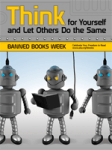Although not written in connection with our Banned Books Week, the books columnists for The Independent raised an interesting question earlier this month in connection with something London libraries were doing: are there some books that public libraries shouldn’t carry?
 Boyd Tonkin came up with a list of 10 books that could conceivably raise that question. They include Messages to the World, a collection of statements by Osama bin Laden; Did Six Million Really Die?, a Holocaust denial pamphlet; the Marquis de Sade’s The 120 Days of Sodom; Milestones, a book Tonkin calls a “core text for jihadis”; and Adolf Hitler’s Mein Kampf. In a typical lawyer-like response, I say whether they show up in a public library depends.
Boyd Tonkin came up with a list of 10 books that could conceivably raise that question. They include Messages to the World, a collection of statements by Osama bin Laden; Did Six Million Really Die?, a Holocaust denial pamphlet; the Marquis de Sade’s The 120 Days of Sodom; Milestones, a book Tonkin calls a “core text for jihadis”; and Adolf Hitler’s Mein Kampf. In a typical lawyer-like response, I say whether they show up in a public library depends.
For example, there is no reason a university library should reject any of these books. That may or may not be true for a middle school. While it’s hard to see the value or role of The 120 Days of Sodom in a middle school or high school library, there certainly are legitimate arguments that the bin Laden collection or Mein Kampf are worthy of study or analysis.
For public libraries in general, I don’t think it’s a question of whether libraries should own them at all but the nature of any restrictions placed on their circulation. You certainly aren’t going to let pre-teens check out the Marquis de Sade’s work but what if he or she is researching a paper on the jihadists? While some view restricting access as a form of banning, I don’t necessarily agree. As long as a library has — and follows — recognized policies and procedures for what books go into general circulation and alternative means of access for those which do not, as well as appeal and parental opt-out or opt-in procedures, I see no reason why we would otherwise restrict the content of our libraries.
Even the Bible suggests that forbidden fruit is more tempting.
If man is to discover truth, he must have access to all information and ideas, not just those fed to him.







